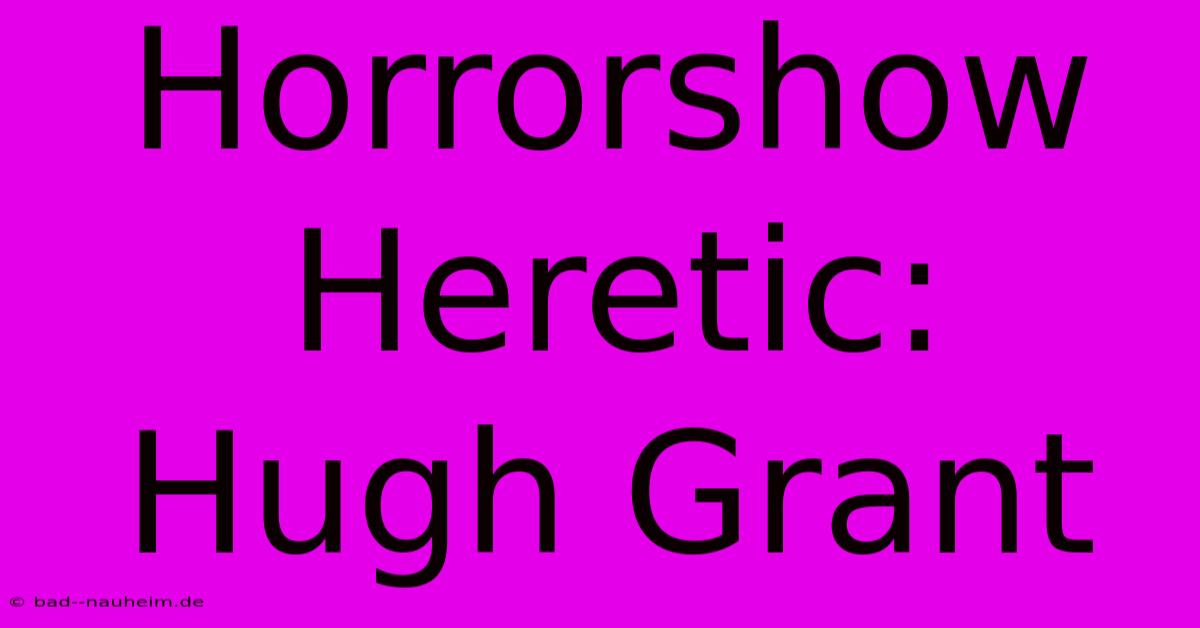Horrorshow Heretic: Hugh Grant

Discover more detailed and exciting information on our website. Click the link below to start your adventure: Visit My Website. Don't miss out!
Table of Contents
Horrorshow Heretic: Hugh Grant – A Re-evaluation of the Rom-Com King
Hugh Grant. The name conjures images of charming stammering, perfectly tousled hair, and a seemingly effortless ability to win over the hearts of women (and audiences) alike. He's the quintessential British rom-com heartthrob, synonymous with films like Notting Hill and Four Weddings and a Funeral. But what if we peeled back the layers of charming bumbling and revealed a darker, more unsettling side to his filmography? This isn't about exposing scandalous secrets; it's about exploring a fascinating, albeit subtle, undercurrent of the "horrorshow" within his carefully crafted persona.
The Unreliable Narrator: A Recurring Theme
Grant's characters, while outwardly endearing, often possess a troubling ambiguity. They're not necessarily villains, but they frequently demonstrate questionable morality, a penchant for self-serving behavior, and a distinct lack of self-awareness. This characteristic subtly transforms many of his seemingly lighthearted performances into something much more unsettling.
The Mask of Charm: Hiding Deeper Issues
Consider his role in Four Weddings and a Funeral. While charming and ultimately endearing, Charles is also selfish, indecisive, and prone to emotionally manipulative behavior. His pursuit of Carrie is less a romantic journey and more a chaotic stumble punctuated by self-centered actions. This isn't simply comedic awkwardness; it's a glimpse beneath the surface of a character who struggles with genuine emotional connection.
Beyond the Laughs: A Disquieting Undercurrent
Even in his most successful rom-coms, Grant's characters often occupy a morally grey area. Their charm masks insecurities and flawed behaviors, making their romantic pursuits seem less like genuine expressions of love and more like conquests driven by ego and a need for validation. This creates a fascinating tension: we laugh at their antics, yet simultaneously recognize a deeper unsettling truth beneath the surface.
The "Horrorshow" Aesthetic: Subtlety and Discomfort
The "horrorshow" in this context doesn't refer to outright horror, but rather a lingering sense of unease and discomfort. Grant's performances often lean into this space. He masterfully portrays characters who are simultaneously appealing and deeply flawed, creating a dissonant experience for the viewer. We're drawn to their charm, yet simultaneously repulsed by their questionable actions. This nuanced approach creates a unique and compelling cinematic experience, one that lingers long after the credits roll.
The Power of Subtlety: Building Tension
Grant’s skill lies in his ability to convey these unsettling aspects subtly. It’s not about dramatic reveals or over-the-top performances; instead, it's in the micro-expressions, the hesitant pauses, the slightly off-kilter delivery of a line. These subtle choices create a cumulative effect, building a sense of unease and questioning the true nature of his characters.
Re-evaluating the Legacy: A Complex Portrait
By viewing Hugh Grant's filmography through this "horrorshow" lens, we gain a new appreciation for his performances. He's not simply a charming romantic lead; he's a nuanced actor capable of portraying complex, flawed characters with a disturbingly captivating charm. This re-evaluation reveals a fascinating, and perhaps unsettling, depth to his career that transcends the simple categorization of "rom-com king." He's a master of subtlety, using his inherent charm to mask a deeper, more complex, and arguably more interesting persona. This unsettling duality is what elevates his performances beyond simple romantic comedy, creating a lasting, and subtly disturbing, impression.

Thank you for visiting our website wich cover about Horrorshow Heretic: Hugh Grant. We hope the information provided has been useful to you. Feel free to contact us if you have any questions or need further assistance. See you next time and dont miss to bookmark.
Also read the following articles
| Article Title | Date |
|---|---|
| Squid Game Erfolg Mit Kapitalismus Kritik | Dec 26, 2024 |
| Lawinenunfall Innsbruck Verletzter | Dec 26, 2024 |
| Neuer Nfl Film Qb Auf Netflix | Dec 26, 2024 |
| Masarova Comeback Im Schweizer Tennis | Dec 26, 2024 |
| Masarova Rueckkehr Aufs Tennisfeld | Dec 26, 2024 |
